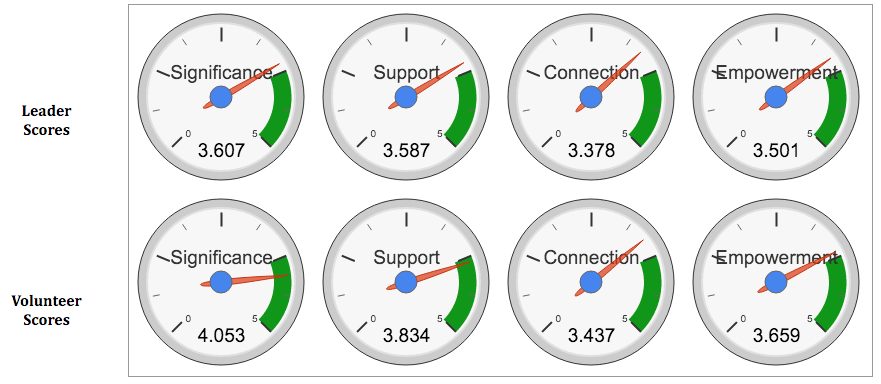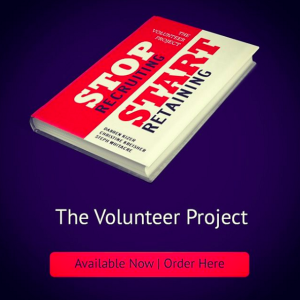This month, we are celebrating the one-year anniversary of the release of our book The Volunteer Project: Stop Recruiting. Start Retaining. I know, it seems weird to celebrate a book. But when you’re a first time author, and you invest hours and weeks and months into jotting down words and fine-tuning your ideas, you spend a lot of time asking yourself: Is anyone actually going to read this stuff?
It turns out that, at least for The Volunteer Project,the answer is yes! Within our first month in the marketplace, we met 50% of our goal for first-year sales. To date, we have more than tripled that goal. Apparently church and nonprofit leaders are itching to figure out how to make their volunteer cultures the types of environments where volunteers not only stay involved, but invite their friends to join them as well.
Something that makes The Volunteer Project unique is our Zero Recruitment Model (ZRM) Survey. The ZRM is an online assessment tool for measuring volunteer satisfaction. It captures data from both leaders and volunteers, and provides a picture of areas within the four strategies (celebrate their significance, provide first-class support, fuel meaningful connections, and empower their passions) where leaders can invest to improve their volunteer cultures and ultimately their retention rates.
Over the past year, over 100 ministry teams have participated in the ZRM. These ministries have varied from volunteer groups of 10 people to 1,000s of individuals. Some of the leaders who utilized this tool are seasoned veterans with 20+ years of experience, and many are young leaders who are striving to create a fresh culture for their volunteers. Many of you reading this post may have even taken the survey and benefited from your personalized results. Today, I want to share some big picture ideas we noticed when we combined data from all of the churches and nonprofits that have participated.
In the volunteer portion of the survey, we ask volunteers to respond yes or no to the question:Do you see yourself continuing to volunteer at this organization six months from now? 95.2 percent of volunteers said yes. That’s great news! 95 out of 100 volunteers plan to continue serving! However, what about the other five percent? We wondered if there are some commonalities among those choosing to leave. So we compared their scores to those who indicated they planned to stay. The results were revealing. In all categories, the five percent scored lower than those who indicated they planned to continue in their volunteer roles.
Here are three of the observations we made this year, in light of the combined data provided by the churches and organizations that have participated in the survey:
1. Volunteers aren’t making the connections they expected to If you want to raise your retention rate, the lowest hanging fruit is to provide better connections among your volunteers. We discovered that, across the board, from leaders to volunteers, nobody thinks this is happening well. One of the benefits volunteers expect when they sign up to volunteer is stronger friendships. The greatest thing you can do to help your volunteers feel more satisfied in their roles is to elevate their connections to one another.
2. Leaders think they are providing great support, but their volunteers just aren’t feeling it.While everyone agrees that we’re not knocking it out of the park when it comes to connection, there are some areas—like providing support—where leaders think they are doing great, but volunteers often disagree. Among the five percent who chose to terminate their participation as volunteers, many say they did so because they didn’t feel supported or empowered enough.
Have you ever seen one of those commercials for air fresheners or deodorant in which the individual no longer realizes that their living space, car, or body stinks? When it comes to supporting volunteers, many leaders think they are providing more resources and training than they actually are. If you want to raise your retention rate, ask yourself the question:If I was informed that an anonymous, undercover volunteer was serving in my ministry next month, what elements of support to volunteers would I immediately change, improve, fix or speed up?
3. Everyone agrees volunteers are making a difference—however, ongoing feelings of underuse will eventually override the staying power of significance. Establishing feelings of significance within your volunteers is a powerful thing. People love knowing they are making a difference. It’s obvious that what you do at your organization matters! Unfortunately, this won’t retain volunteers if they don’t feel empowered or that they are in roles that fits their gifts and skills. If you want to take your volunteer culture to the next level, lean into empowerment. Help your volunteers to achieve their goals and to find ways they can grow both in their roles and as individuals.
Thank you to everyone who engaged with The Volunteer Project this first year, shared it with your teams, and participated in the Zero Recruitment Model Survey. We’ve had a lot of fun hearing your stories and interacting with the volunteers you lead. Our team is excited to continue to learn and explore the intricacies of what makes volunteers stick.


